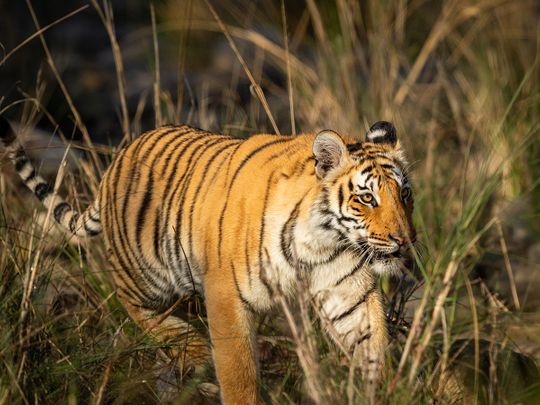
Johannesburg: A tiger escaped from a private property in Johannesburg on Monday, just weeks after another went on the loose near the city, reigniting calls for stricter regulations on keeping wild animals.
A private security firm in the northeastern suburb of Edenvale said the runaway animal was recaptured hours after it was spotted roaming the area.
“It has been taken to a safe sanctuary,” Gary Wilson of security firm S.W.A.T. said, adding the tiger was “in good condition”.
It was not immediately clear who the big cat belonged to and exactly where it had escaped from.
Security cameras footage circulating on social media showed the tiger - believed to be a nine-month-old female - roaming around a parked car in what appeared to be the backyard of a house in the early hours of the morning.
Earlier this month, another tiger had escaped from an exotic farm near Johannesburg.
That animal, a female Bengal tiger named Sheba, roamed the countryside for four days, attacking a man and killing several animals before it was euthanised.
Tigers are not native to South Africa but there are no laws banning owning them as pets.
Rearing the big cats has become a flourishing industry in the country, where they are kept as pets or bred for commercial export.
Smaragda Louw, director of non-profit organisation Ban Animal Trading, said the new incident showed it was too easy to own wild animals and stricter rules were needed.
“What we need to look at are the laws. We know that they are completely outdated,” she told AFP.
Tshepo Mokalapa, an inspector with the National Council of Societies for the Prevention of Cruelty to Animals (NSPCA), said the organisation was “opposed to keeping wildlife as pets, especially big cats like tigers”.
Animal rights groups are deeply concerned by the growing trend in breeding big cats in South Africa.
Tiger farming was spawned by the country’s breeding of lions for commercial hunting.
A report by animal rights charity Four Paws said 452 live tigers and tiger parts were exported from South Africa from 2011 to 2020.
It said the top buyers of live tigers, which are an endangered species, included China, Thailand and Vietnam, where there is “high demand for tiger parts used in traditional medicine and luxury items”.
Globally, there are three times more tigers in captivity than there are in the wild.









_resources1_16a30b3523c_small.jpg)
